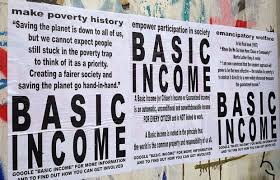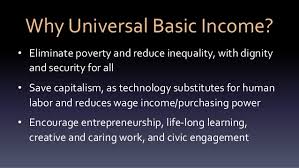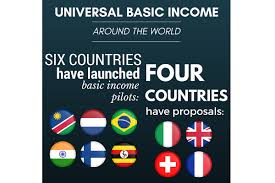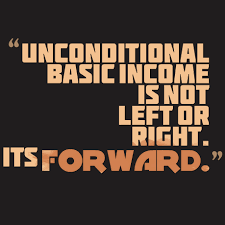
A Basic Income for All……Seriously?
This concept of a Universal Basic Income for all has been doing the rounds for a long time now and re-emerges regularly when some newsworthy person or other decides to be an advocate. Recently Mark Zuckerberg (Facebook CEO) delivered a commencement speech to US Harvard graduates in which he called for “exploring a system of wealth distribution known as Universal Basic Income”. And so followed a renewed flurry of commentary about this groundbreaking concept and how it might work. Or how it could never work.
The WeMakeDo family has been trying for some time now to experiment with tightening up our household annual costs and at the same time considering how we would live if we were to stop living off salaries from for-profit companies. Mrs WeMakedo started her own business a few years ago (the Babymarket.ie) which has been thriving but is not sufficient to sustain us yet. Mr WeMakedo has been considering ending his salaried position of 20 years simply because it no longer meets any of the higher order needs that can become more important to us as we get older.
You know that itch of the soul that starts to become harder to scratch as routine and monotony starts to kick in. Working for someone else can get a little wearisome and usually change is a good thing to bring upon ourselves.
A regular salary is nice and comforting but it can be detrimental to your motivation and creativity. Unless you are one of the lucky few who love what they are salaried to do, then its seems there is a limit to how much enthusiasm one can continue to generate for someone else’s agenda when they are paying you to do it. Some would say that a regular salary is the best way to stifle creativity and ingenuity. As the insightful author Nassim Taleb (author of “The Black Swan”) has said, “The three most harmful addictions are heroin, carbohydrates and a monthly salary”.
Of course one has to be practical too and ensure that family needs that we determine to be important, can be, and will continue to be met. But in a society where self-worth has become strongly attached to one’s “career” position and one’s outwardly displayed signs of high income, we are in danger of losing sight of what really satisfies us. And when you start to figure that out, then if a salaried job isn’t in some way aligned with those sources of satisfaction, then it needs to be seriously delivering in other ways to make it continue to be worthwhile.
For some people, that satisfaction may truly come from driving an expensive car to work at a company where we feel our position also commands respect from peers. But for some, this career path we are sold may turn out to not bring that deeper satisfaction we are craving. For some like myself, it just seems to take longer for the realisation to occur and then for some decisive action to follow.
Universal Basic Income is the idea that a government will pay every citizen some guaranteed regular amount to live-on so that their basic needs can always be met. It is not intended as a means to allow people to live without contributing to society. In fact, the model intends (and some evidence suggests) that by being freed from the stress and/or monotony of having to find a way to meet one’s basic needs, it will allow for larger sections of society to engage in fulfilling and still productive activities. The model assumes that the societal gain from this approach to funding people’s basic cost of living should outweigh the direct financial costs of funding the UBI.
At its most basic, UBI will lift a large section of society out of poverty. With this approach, everyone will have enough money to live to a basic standard. The UBI also may also help growing populations deal with the emerging trends in industry which suggest that as automation and artificial intelligence take hold, there will be fewer manual or menial jobs available for the population in general.
What will the masses do if there are no factories to get mind-numbing work in? Well, they’ll probably figure out better ways to use their time. Happier people should lead to improved general well-being, health and community engagement.
Some would argue that the free market model we currently follow in the capitalist world will force those in need of a salary to survive by whatever means is available to them, to become more inventive about how they meet their needs. But it’s hard to see how this forced creativity can be as good for society as a whole (or as enjoyable) as the unforced creativity afforded by the presence of a basic income in a UBI society.
The question of where the funding for the Basic income comes from seems somewhat contentious. In most proposed versions, taxes are raised to do this. Thus, a large scale redistribution of wealth would take place, from those who can afford to pay which is then used to stimulate the less well-off in society. In this model, it is expected that those less well-off people will now tend to put more of the (UBI) wealth back into the economy and thereby grow it significantly. In other words, after the initial shock of the increased taxes subsidies, the overall economy will grow significantly to the point where the tax burden of providing UBI is no longer felt as a burden.
All well ‘n good if you’re not part of the wealthy section of society that will feel like it has to pay for this experiment. But there is a well researched economic thesis that suggests that as the wealthy in society become more wealthy, they are stifling economies by hoarding this wealth. As they control more and more and prefer not to spend it (in order to stay wealthy), this tends to have a dampening effect on the economy.
We currently try to get around these stagnating economic scenarios by the use of “stimulus” packages such as we have seen in many countries since the 2007 financial crisis. Most often this takes the form of government infrastructure spending on roads and bridges, thereby indirectly forcing large sums of money into circulation or, also by simply printing more money for banks to loan out to borrowers which tends to be used in the US economic model. These are also just different means of infusing a stagnant economy with large amounts of cash.
Is distributing this money to individuals to use for their basic needs that much different to what we are now doing in times of economic difficulty?
It is also argued by those against the UBI, that without the incentive to work, the majority of people simply won’t do anything. And the funny thing here is that many of us tend to think that “of course I would want to be productive, but its those other (insert some adjective to describe those we think of as inherently lazy) who wouldn’t bother”.
Actual test cases of the UBI in action have shown that very small reductions in the numbers who want to work are observed and in some cases an increase in numbers takes place.
The truth here is that we all need to feel valued and to feel we contribute to our social circles in some way. And so small experiments in use of UBI have already shown that the numbers of those being productive will tend to go up rather than down once basic needs are met. The difference with a basic income in place is that the life-happiness measures go up a lot when the choices for how you make your contribution not hampered by the need to earn a salary from them.
Imagine how much more creativity we would see in such unrestricted societies?
For lots of info on what is happening to progress the Universal Basic Income movement, visit http://basicincome.org/
Now back to work.
For at least a little while longer.


